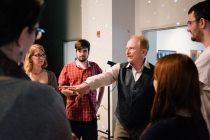
“KAL” Kallaugher bashes Cartoon Wars
Kevin “KAL” Kallaugher, a local political cartoonist, shares his thoughts on freedom of speech sparked by the Cartoon Wars and Charlie Hebdo Massacre.
After a decade long decline of political cartoons, cartoonists are slowly garnering attention once again, but not in a positive way.
Kevin “KAL” Kallaugher, a local political cartoonist, shared his thoughts on the fight for freedom of speech brought on by Charlie Hebdo and the controversial Paris massacre.
Kallaugher has been a political cartoonist for the Economist Magazine for 37 years, and is currently contributing work to The Baltimore Sun.
Although he has won many awards, such as the 2015 Herblock Prize and The Grand Prix for Cartoonist of the Year in 2014, he knows this field of work is rather controversial.
He explained that today’s society consists of many taboos and cartoonists have a habit of pushing boundaries. Gun control, war and religion are just a few of the matters that cause heated discussion. Kallaugher believes proper communication is key in dealing with such topics.
In 2003, the “Cartoon Wars” began after cartoons of Prophet Muhammad were being distributed. These images were rejected because they were offensive to some readers. Protests and strikes took place in areas such as Germany and Bosnia, and reprints of the images began to creep up, including Hebdo’s 12 reprints of Muhammad and other political and religious figures.
Although Kallaugher does not agree with some of Charlie Hebdo’s work, he does not discount what he did with reprinting such controversial images. That was what sparked the debate on issues concerning freedom of speech and the press.
But where exactly do you draw the line? This was when Kallaugher went up to the board, and started drawing a cartoon in a box. “The wall behind you” he said, “is the first amendment and the line in front of you are societal pressures.” According to Kallaugher, as a cartoonist, you need to learn how to balance these two influences. In the end, it’s ultimately how we phrase things.
Kallaugher believes our generation will change the ideas of freedom of speech.
He said, “It’s not what we say it’s how we say it, and to make a change we have to fight for it.”
Photo credit: Patrick Alejandro
Read more stories from: The Retriever Weekly





